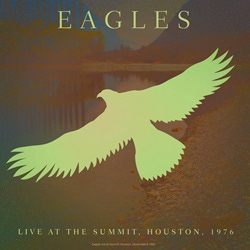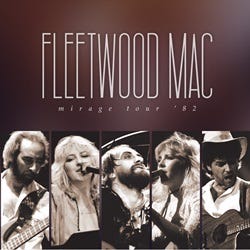What Makes A Rock Live Recording Exceptional?
The Eagles–Live At The Summit, Houston 1976 (Leftfield Media, 2016) and Fleetwood Mac-Mirage Tour '82 (Rhino/Warner Bros, 2024)
If I were king of the world, I would place a moratorium on every “classic rock” radio station, prohibiting playing any (among many others): Journey, Queen, Led Zeppelin, Eagles and Fleetwood Mac. I am aware I do not speak for everyone, much less a majority. I want everyone to listen to music…even bad and overplayed music. Music is a transformative art. It is also a commodity like pork bellies and sweet crude. The latter characteristic drives radio programming, as well as the cynical release paradigm of the major recording labels. The result is a dilution of appreciation of the exactly fine with music was when first recorded. America, the land of taking for granted.
This same issue applies to live recordings by a popular rock band who had the good fortune of longevity. Late in their career, many bands from the golden age of rock music capitalized on Baby Boomer nostalgia convulsions by producing pristine live recordings, studio perfect, with the conviction of a criminal and the soul of the damned. Both the Eagles and Fleetwood Mac released live albums during their popularity and then later in their life cycle. The Eagles released the nauseating mistake Eagles Live (Asylum, 1980) which I addressed in my Wild Mercury Rhythm article “The 25 Best Live Rock Recordings - Coda.” Then, each generation since, the band released Hell Freezes Over (Geffen, 1994) and Live from the Forum MMXVIII (Rhino, 2020). What these live recordings have in common is a near clinical attention paid to the performances.
Besides having several lifetimes, the most popular, including Lindsey Buckingham and Stephanie Nicks, Fleetwood Mac released Live (Warner Bros, 1980) including live material from 1975 to 1980, spanning Fleetwood Mac (Warner Bros, 1975), Rumours (Warner Bros, 1977), and Tusk (Warner Bros, 1979). While Live is not as bad as Eagles Live, it is safely faithful to the studio recordings, showing zero courage to color outside of the commercially acceptable box. Break forward to The Dance (Warner Bros, 1997) and the listener hears surgery bay clean live recording that offers nothing over the original studio releases. Both bands were young and hungry once and unafraid to take chances in live performance. But where are the live recordings to support this?
In the respective record company vaults, hoarded like some imperfect diamonds to be brought out as the ship is going down.
In the 1970s and ‘80s, bands recorded a large amount of live material, often cherry-picking from several performances to include on a single live release (think Blue Öyster Cult’s Some Enchanted Evening (Columbia, 1978) which even included a performance of "(Don't Fear) The Reaper" recorded at Barton Coliseum in my very own Little Rock, Arkansas. What got released was what was only considered the best and most faithful performances, not the most exciting or vital. The commercially released live recordings typically included: no surprises, no invention, no imagination, no drama. The band most responsible for bringing studio fidelity to the stage was Creedence Clearwater Revival. Even their Woodstock appearance was faithful to the studio, making it as boring as it was historic. What great studio albums, though!
Beautifully, the increased storage capacity of compact disc and digital streaming gave given birth to an additional revenue stream for the record companies: releasing archival live recordings that were previously considered too inferior to release. Realizing (late) that a market exists for these recordings, more and more live material has been released. Granted, a good deal remains inferior, but even a corporate blind pig finds an acorn and releases it. Two grand examples are The Eagles and Fleetwood Mac, who have released archival concerts from their heydays, Live At The Summit, Houston 1976 (Leftfield Media, 2016) and Mirage Tour '82 (Rhino/Warner Bros, 2024), respectively.
When the Eagles took the stage at The Summit in Houston, November 6, 1976, for their Hotel California tour, the band was still a month away from the album’s formal release. Founding member Bernie Leadon had left the band the year before, drummed out by an increasingly assholish Glenn Frey and troll-like Don Henley, and subsequently replaced with Joe Walsh of The James Gang and Barnstorm and Don Felder, who had previously contributed the slide guitar on “Good Day In Hell” and guitar solos on “Already Gone” from 1974’s On The Border (Asylum). When Felder formally joined the band, he providing the banjo, mandolin and pedal steel guitar previously supplied by Leadon. Between March and October 1976, the band that recorded Hotel California comprised considerably conflicted personalities compared to the previous recordings. Add to this the ever presence of the mercurial Frey and Henley as irritants and the recording that resulted was a masterpiece. A piece of grit will produce a pearl. Just think of Abbey Road (Apple, 1969) and Let It Be (Apple, 1970). The Beatles were never getter than when they were falling apart.
At this time, the Eagles were still a creative band with a hunger for innovation and success. They were still 30 years away from becoming the briefcase-carrying business executives who produced the cynically soulless performances on Hell Freezes Over (Geffen, 1994) and Live from the Forum MMXVIII (Rhino, 2020). But Live at the Summit, Houston, 1976, that was something very different. Despite the seeds of the band's end already being planted, the Eagles were at the top of their game, genuinely caring and playing music that mattered.
The band kicks things off with the newly minted “Hotel California,” the song that would make an already famous and popular band, and Don Felder in particular, mythic. While “Hotel California” showed the brief, bright future, the band did not neglect the older material, the music with teeth. These performances of “Already Gone,” “Good Day In Hell,” and “James Dean” are searing testaments to the band. The 10-plus minute “Witchy Woman” show that the band could think outside the studio, stretching out on a signature song. Joe Walsh contributed the best of his personal material, “Turn To Stone,” “Funk #49,” “Rocky Mountian Way,” and “Walk Away.” The silly “Life’s Been Good” and “In The City” were still in the future, on the band’s way down. This is how rock music is supposed to be played live, angry, arrogant, and a little bit desperate. Not with Vince Gill at the Las Vegas Sphere at $2400 a pop as Glenn Frey spins in his grave knowing that Don Felder won after all.
And what of Fleetwood Mac? Specifically, that band that existed between Fleetwood Mac (Reprise, 1975) and Tango In The Night (Warner Bros, 1987), though the classic Stevie Nicks-Lindsay Buckingham band effectively ceased to exist on Live (Warner Bros, 1980), released the same year the equally bad Eagles Live was released. But unlike the Eagles, who were reaching their zenith, Fleetwood Mac was in decline, but still a potent musical force. The Buckingham-Nicks axis had fully devolved by 1982. There was to be no more Rumours (Warner Bros., 1977). That was fully in the rearview. This was a band that was tired, bitter, and angry. To hear the malignant animus of relationships broken beyond fixing, just listen to “The Chain” where Buckingham and Nicks spit Alien slime at one another, barely containing their loathing. This is not the polite Southern California rock that provided the soundtrack for a million teenaged assignations. This was love gone horribly wrong and never did the band play with such excitement and conviction. Hell, listen to “Yesterday’s News” and “Don’t Stop.” This is white-hot emotion.
Even the normally placid balladeer Christine McVie even had enough with the shit within the band. She turns “You Make Loving Fun” into a taunting kiss-off where she all but grits her teeth. Counting off the playfully sensual song at a relentless tempo, McVie cynically blows black kisses at Mick Fleetwood and John McVie. In short, she added balls to the song, making it as real as suicide. This is not the pathetic, overproduced lie that was The Dance (Reprise, 1997). Sure The Dance made ever dewy-eyed Baby Boomer long for the sticky backseats of their youth. But there was not a shred of honesty in it.
But imagine Lindsey Buckingham tipping his hat to Peter Green on a swinging “Oh Well” before transforming into a caustic “Rhiannon” sung by an impatient Nicks. Buckingham’s guitar solo is molten and dangerous, floating above Christine McVie’s electric piano. Even the band’s greatest accomplishment, “Go Your Own Way” is quaintly neutered, revealing none of the hard feelings that generated the song. Listen to it on Mirage Tour '82 and realize what was really going on. Buckingham is inspired and Fleetwood plays some of the greatest rock drumming recorded. Buckingham spits out the words, losing his breath in the bargain. Nicks and Christine McVie do everything but flip off Buckingham as they show him the door.
Mirage Tour '82 is how one would wish Fleetwood Mac to sound in pursuit of that feeling, never to be captured again. These performances reek of commitment to the anger within the band. Even Stevie Nick’s precious “Landslide,” that song that tickled the backside of two generations of teenaged girls, is finally presented accurately as the song of loss that it is. This is what rock music is.





Thank you for your kind words, Emilia!
Damn, that was excellent. Really really great. I’m going to relisten to the FM recording shortly with renewed interest. Thank you!